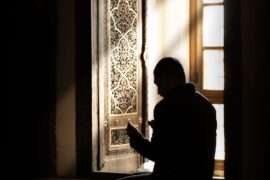My younger sister studied Islamic Finance and thus did a unit on wealth management, a subject that she’s deeply passionate about. So a couple of months back, I noticed that whenever she’d be contemplating to buy something she’d say to herself, ‘أو كلما اشتهيت اشتريت’ (Is it that whenever you desire something, you buy it?) or when we’d be walking in the market or just the street and notice something we like, but cannot really afford it at the time, she’d say the same. I later came to find out that this words were actually from Umar ibn Khattab, may Allah be pleased with him.
عن جابر بن عبدالله رضي الله عنه أنه قال: رأى عمر بن الخطاب لحمًا معلقًا في يديّ فقال: ماهذا يا جابر؟ قلت اشتهيت لحمًا فاشتريته، فقال عمر: أو كلما اشتهيت اشتريت ياجابر، أما تخاف هذه الآية ( أَذْهَبْتُمْ طَيِّبَاتِكُمْ فِي حَيَاتِكُمُ الدُّنْيَا) سورة الأحقاف آية (20).” (https://al-maktaba.org/book/31621/62202#p3)
On the authority of Jaber bin Abdullah, may God be pleased with him, he said: Omar bin Al-Khattab saw meat hanging in my hands and said: What is this, Jabir? I said, I craved meat, so I bought it. Omar said: Is it that whenever you desire something, you buy it?, O Jabir. Do you not fear this verse (You have exhausted your share of the bounties in the life of the world…)?!” Surah Al-Ahqaf, verse (20)
The point Umar may Allah be pleased with him was trying to make, wasn’t to prohibit him from eating meat but rather to remind him of the moderation that is required in Islam. To make him distinguish between a want and a need. And so I’ve been pondering about this phrase that has become a favourite phrase between my sister and I.
In a world of instant gratification, where everything is a phone call away, or a tap away, materialism and consumerism has become so common. Every app you open, there is a new trendy item, a new top-notch vacation location, a new exciting trip… We go crazy over Black Friday, Clearance sale and Offers, wanting everything we come across, wanting to experience all the cool experiences. It is so easy for any of us to be lured and enticed into spending, sometimes on things we don’t even use or will take ages before we ever need them.
Now, the goal here isn’t that people shouldn’t enjoy life or spend on what they love. But rather, being mindful and moderate in our spending and consumption. Indeed it is Allah Subhanahu Wataala who said in Surat Qasas, verse 77, “…Seek the ˹reward˺ of the Hereafter by means of what Allah has granted you, without forgetting your share of this world.”
Imam Malik (may Allah have mercy on him) was asked about this verse, and he said: It means living, eating and drinking without imposing unnecessary restrictions on oneself.”(Al-Muntaqa 4/302). This view is supported by the words that precede these: { But seek, through that which Allah has given you, the home of the Hereafter} [al-Qasas 28:77]. In other words: use what Allah has given you of this abundant wealth and blessings to obey your Lord and seek to draw close to Him by doing different acts of worship and righteous deeds, through which you may attain reward in the hereafter, yet at the same time do not forget your share of this world. So We do not instruct you to give all your wealth in charity and leave yourself destitute; rather spend for your hereafter and enjoy your life in this world in such a way that will not harm your faith or your hereafter.” See: Tafsir at-Tabari (19/625); Tafsir Ibn Kathir (6/253); Zad al-Masir (6/241); Tafsir as-Sa‘di (p. 623).
Allah in Qur’an says: “And let not your hand be tied (like a miser) to your neck, nor stretch it forth to its utmost reach (like a spendthrift), so that you become blameworthy and in severe poverty” (Al-Qur’an, Al-Isra: 29). Also in a Hadith, Prophet Muhammad (pbuh) said: “Spend according to your means; and do not hoard, for Allah will withhold from you.” (Al-Muslim, Book of Zakah, Vol 3, Hadith No. 2378).
Islam requires us to have restraint and discipline when it comes to our desires. It is thus important to always think whenever we want to purchase something, whether materials or food or even an experience. Is it a need or a want? Is there something else that is a bigger priority? Can I do without it? For example, many of us have piles and piles of clothes, gathering dust in our wardrobes, yet we rush for shopping sprees even when it is unnecessary.
In a world that promotes wastefulness and extravagance, in a world of ‘You Only Live Once’, ‘Shop Till You Drop’ and ‘Buy Now, Pay Later’, let us strive to be among those who embrace minimalism. Let us borrow from the simple and humble lifestyle of our prophet peace be upon him by being content, utilizing our resources wisely and living within our means. We have so many people, both young and old, who nowadays go deep in debts to live a lifestyle that they cannot even afford. And sometimes, this is fueled by watching, admiring or even envying what we see on social media or around us, forgetting it is a curated lifestyle. The Prophet said, “Contentment is a treasure that is never exhausted.” And in another hadith he said, “Wealth is not in having many possessions, but rather (true) wealth is feeling sufficiency in the soul.” (Sahih al-Bukhari 6446)
There is a tradition my sister learnt from our elder cousin (Allah Ybarik) where whenever she’d buy something, she’d give out one of her pre-owned items. So if she buys a new abaya, she gives out one (or more) of her previous ones (still in a good state) to close family members or anyone deserving. If she buys a pair of shoes, she gives out another. This is to avoid hoarding, encourage charity and ensure mindfulness in spending and consuming. I thus share this tradition with you all with the hope that you’ll also embrace it and pass it to your loved ones too. The prophet peace be upon him said, “He who introduced some good practice in Islam which was followed after him (by people) he would be assured of reward like one who followed it, without their rewards being diminished in any respect…” (Sahih Muslim 1017e)
With Eidul Hajj fast approaching here is a reminder to be mindful in your spending and eating. I know they’ll be plenty of meat for some families, yet let us remember, moderation, moderation, moderation. Let us avoid extravagance. Let us not obsess over what we lack, comparing ourselves to others. Remember that everyone is missing something they yearn for. So let us focus on what Allah has blessed us with instead, be grateful and content with what we already have.
And whenever you’re about to buy something unnecessary, remember the words of Umar may Allah be pleased with him,
“!أو كلما اشتهيت اشتريت”
***
The Day of Arafah, the Day for Duas is around the corner. I hope you have your list all the things and matters you wish for from Allah, however impossible it may seem. Please do remember me and my family in your duas. May Allah accept from us, forgive us, guide us and comfort our souls with answered duas, ameen. Have a blessed time and a lovely Eid good people 🙂





1 Comment
Wallah it’s true…we end up buying lots of things when we have plenty in our wardrobes…May Allah guide us all..ameen